Responses to Israeli assassinations are echoing across every tongue and corner of the world. While there is no disagreement that a response will occur following the assassinations of Fouad Shukr in southern Beirut, officials from the Popular Mobilization Forces in Iraq, and Hamas Political Bureau Chief Ismail Haniyeh in Tehran, the question remains: when will this response happen and what will its scale be?
A knowledgeable source told "Al-Anbaa": It is impossible to predict the timing and scale of the response. This depends on the capabilities of ongoing communications on various fronts aimed at preventing an eruption of the situation in the region. While it is certain that a response cannot be avoided, the goal of these efforts is to define the targets and avoid attacks that prompt an equivalent response, or that diverge to affect some vital targets, making it difficult to keep matters under control.
The source continued: In the face of the clatter of weapons and voices unleashing their threats regarding potential attacks or responses, and amid military mobilization and preparations across various fronts, communications are intensifying. Some are public, but most remain undisclosed. Everyone understands that the scale of the adventure, which raises fears of engulfing the region in a response aimed at Israel if it exceeds absorbable thresholds, could lead to Western support for Israel. This may subsequently cause a counteralignment, without excluding the intervention of non-announced forces in the confrontation, albeit indirectly, through the provision of military, logistical, and intelligence support, thus placing the region before an unknown fate.
The source indicated that communications are focused on trying to find exits through specific objectives, such as carrying out assassinations or similar operations, even if they surpass geographical limits. The critical precision of the phase requires monitoring the situation day by day to understand the direction in which things will move by the end of the communications, especially as time narrows to define the zero hour.
Moreover, a military analyst recalled what a Hezbollah official stated in a private meeting: that the party was unable to target a senior Israeli minister or security official in retaliation for the assassination of former Secretary General Abbas al-Moussawi on February 16, 1992, when an Israeli helicopter fired a missile at his vehicle. However, the party has grown stronger and has become what it is today.
This indicates a different target bank for the "party," focused on inflicting painful strikes on Israel, without the intent envisioned by many observers and analysts. The analyst added: The party remains primarily concerned with being in complete readiness to fight the Israeli army for as long as possible, inflicting battlefield losses that compel the Israeli military leadership to acknowledge the superiority of the party's men in the field. This forces the Israeli military command to rely mainly on the air force and advanced smart missiles, leading the Israeli army to abandon special commando units previously entrusted with ground operations.
The analyst continued: The priority for the party remains its missile capability and the high frequency of launches from various categories, as this provides it with the means to paralyze life in several Israeli cities along the Mediterranean coast, ultimately incapacitating the Haifa port and the Karish gas field located offshore.
He noted that the party has enhanced its military arsenal with developed drones capable of penetrating Israeli airspace to carry out missions and then return to their launch points from Lebanese territory. He added: The party also relies on a steadfast military force exceeding one hundred thousand fighters to ensure high-level combat in areas that the Israeli army may invade, without being able to establish positions there, according to "Al-Anbaa" of Kuwait.




